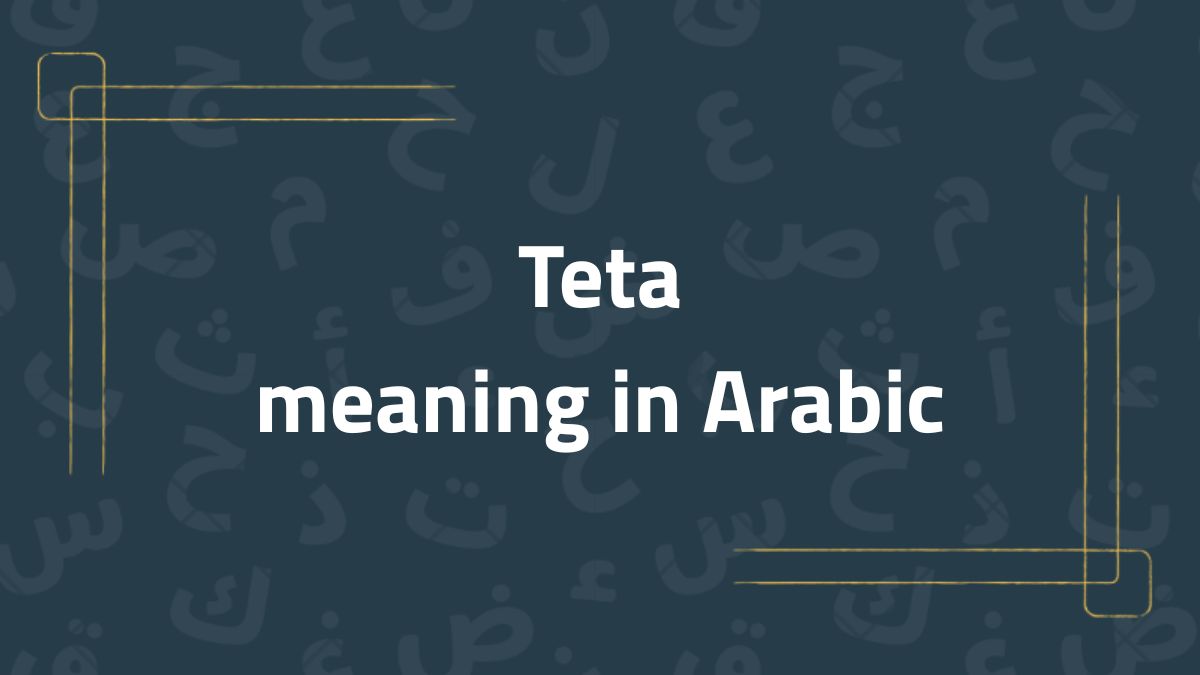The Word "Teta" Meaning in Arabic With Examples

The Arabic word “teta” (تيتا) is a term that carries different meanings depending on the context. It is commonly used in spoken Arabic but may not appear in formal writing or classical Arabic.
This article explains the meaning of “teta,” its linguistic roots, usage in sentences, and any cultural significance.
The Meaning of “Teta” in Arabic
“Teta” (تيتا) is an informal Arabic word used in some dialects to mean “grandmother.” It is a term of endearment, similar to “granny” or “nana” in English. The pronunciation is “tee-tah.”
In other dialects, “teta” can also mean “aunt” or be used as a nickname for an older female relative. The exact meaning depends on the region.
Linguistic Root and Grammatical Usage
The word “teta” does not have a clear root in classical Arabic but is derived from colloquial usage. It is a noun and does not change form based on gender or number. In some dialects, variations include:
-
“Teta” (تيتا) – grandmother
-
“Teto” (تيتو) – grandfather (less common)
Examples of “Teta” in Arabic Sentences
-
Arabic: تيتا تحب أن تطبخ لنا.
English: Grandma loves to cook for us. -
Arabic: ذهبت لزيارة تيتا في العطلة.
English: I went to visit Grandma during the holiday. -
Arabic: تيتا لديها الكثير من القصص الممتعة.
English: Grandma has many fun stories.
Cultural or Quranic Significance of “Teta”
“Teta” is not found in the Quran or classical Arabic texts. It is a modern, colloquial term used in daily conversation. However, respect for elders, including grandmothers, is an important value in Arab culture.
Common Misunderstandings or Mistakes
Some learners confuse “teta” with similar-sounding words like:
-
“Tayta” (طيطة) – slang for “aunt” in some dialects
-
“Jadda” (جدة) – the formal Arabic word for “grandmother”
Why You Should Learn “Teta”
Understanding “teta” helps in daily conversations, especially in Levantine or Egyptian dialects. It is useful for learners who interact with native speakers or watch Arabic shows. Recognizing informal terms like this improves comprehension of spoken Arabic.
Conclusion
The word “teta” is a common term for “grandmother” in many Arabic dialects. While it is not formal, it is widely used in spoken language. Learning such words enhances communication and cultural understanding. Whether visiting family or engaging in conversations, knowing “teta” helps connect with Arabic speakers naturally.
Discover the Quran and Arabic with Shaykhi Academy
We highly recommend Shaykhi Academy for anyone seeking to learn the Quran and Arabic with excellence. The academy is known for combining expert teaching with a compassionate approach, making it a top choice for students worldwide who want to connect deeply with the words of Allah.
At Shaykhi Academy, you’ll find highly qualified teachers who specialize in guiding learners of all ages and levels. Whether you’re just beginning your journey with Arabic letters or aiming to master Tajweed and Quran recitation, their personalized lessons ensure steady progress at your own pace.
With engaging classes, flexible scheduling, and a focus on both spiritual and linguistic growth, Shaykhi Academy makes learning both enjoyable and impactful.
Watch a sample class below to see Shaykhi Academy in action:
Learn Arabic, Quran, And Tajweed With Free Trial!
Make your home a place of faith, understanding, and connection with the Quran. Whether you're starting from scratch or deepening your knowledge, Shaykhi Academy is here to guide you — step by step. ✅ Tailored for all ages ✅ Clear, structured learning ✅ Flexible online sessions ✅ Book your free trial session now!
Learn More
